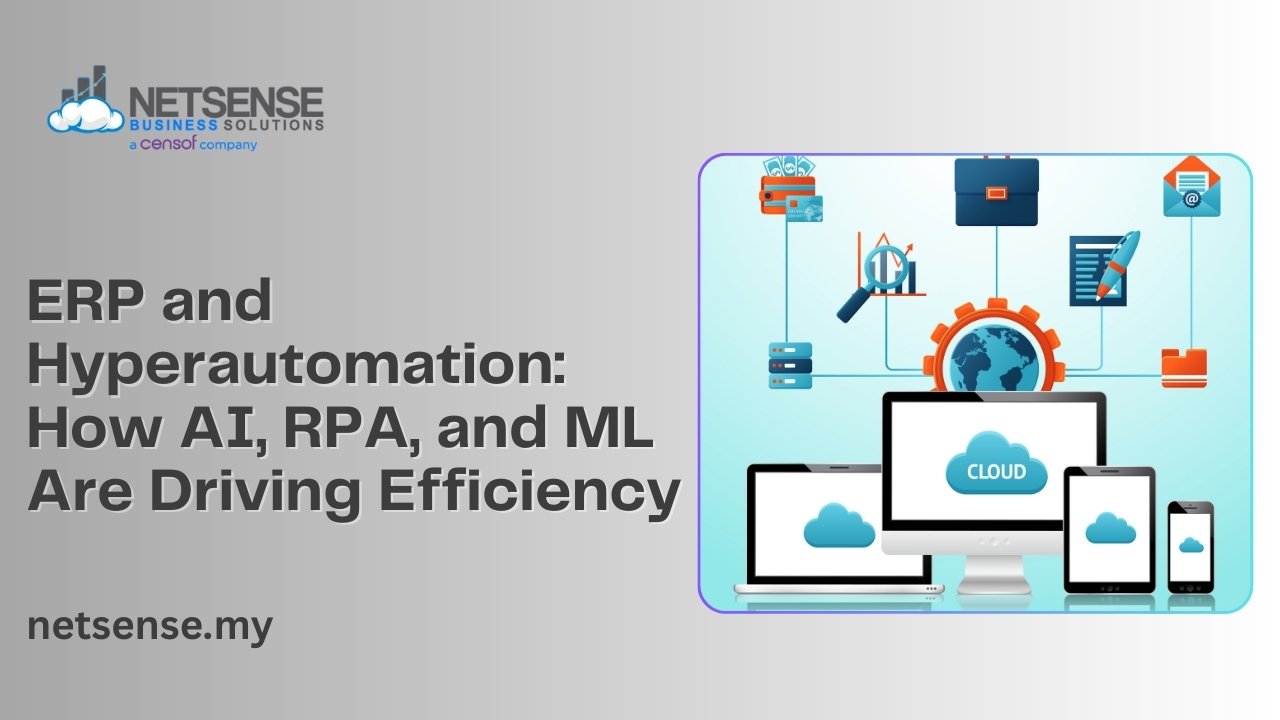Smarter, faster, and more cost-efficient operations are more important than ever as firms in Malaysia and throughout the world contend with growing competition.
While traditional ERP solutions have long aided businesses in increasing visibility and streamlining procedures, hyperautomation—the potent fusion of artificial intelligence (AI), robotic process automation (RPA), and machine learning (ML)—is the game-changer of our day
By embedding hyperautomation into ERP, businesses are not only streamlining procedures but also unleashing new levels of productivity, accuracy, and agility.
What is Hyperautomation in ERP?
Automation is only one aspect of hyperautomation. Hyper automation combines AI, ML, and RPA to build intelligent systems that can learn, adapt, and make decisions, whilst automation manages repetitive activities.
Hyper automation, when combined with ERP, allows organizations to:
- Automate departmental end-to-end processes
- Analyse data in real-time for more intelligent decision-making;
- Reduce manual labour and human error;
- Scale operations without incurring additional costs.
Hyperautomation is therefore a tactical advantage for Malaysian companies seeking to expand in a sustainable manner.
How do AI, RPA, and ML Power ERP Systems?
Artificial Intelligence (AI) in ERP
ERP is improved by AI since it becomes more intelligent and predictive. Businesses can use AI-driven data to:
- Improve inventory and supply chain management
- Automate customer service with chatbots
- Forecast demand more accurately
- To avoid fraud, identify irregularities in financial transactions.
For instance, an AI-powered ERP can predict stock shortages before they happen, helping businesses avoid costly delays.
Robotic Process Automation (RPA) in ERP
RPA uses software bots to automate repetitive, rule-based tasks within ERP systems. This reduces manual workloads and improves efficiency.
With RPA, businesses can:
- Automate invoice processing and purchase orders
- Speed up HR onboarding and payroll management
- Reduce errors in data entry and compliance reporting
- Free employees to focus on higher-value tasks
Instead of manually entering hundreds of invoices, RPA bots process them instantly, saving hours of labour each week.
Machine Learning (ML) in ERP
ML enables ERP systems to learn from data patterns and continuously improve over time. It helps businesses make smarter, data-driven decisions.
Key applications of ML in ERP include:
- Predictive maintenance for machinery and equipment
- Dynamic pricing models based on market conditions
- Personalised customer experiences using behavioural data
- Fraud detection and risk management
For example, manufacturing ERP software with ML-powered features can predict when machines are likely to fail, reducing downtime and repair costs.
Benefits of Hyperautomation in ERP
Integrating AI, RPA, and ML into ERP brings tangible business benefits:
- Increased efficiency: End-to-end process automation reduces delays and bottlenecks.
- Cost savings: Less manual labour means lower operational costs.
- Improved accuracy: Automated workflows minimise human error.
- Smarter decisions: Real-time analytics drive faster and more informed strategies.
- Scalability: Businesses can handle higher volumes without extra resources.
Hyperautomation in Malaysian Businesses
Malaysian organisations are increasingly adopting cloud-based ERP solutions with hyperautomation to remain competitive. From retail to manufacturing, finance to logistics, the benefits are clear:
- Retailers use AI-driven ERP to optimise stock and personalise customer experiences.
- Manufacturers leverage ML for predictive maintenance and production efficiency.
- Finance teams rely on RPA to streamline reporting and ensure compliance.
At Netsense, we empower businesses with ERP solutions designed to integrate hyper automation seamlessly, giving decision-makers the tools they need to scale with confidence.
Final Thoughts
The future of ERP is not just digital — it’s intelligent. By combining ERP with hyperautomation technologies like AI, RPA, and ML, businesses can achieve unprecedented efficiency, accuracy, and agility.
For organisations in Malaysia, embracing hyper automation through Netsense ERP solutions means staying ahead of the curve, improving customer experiences, and unlocking long-term growth.
